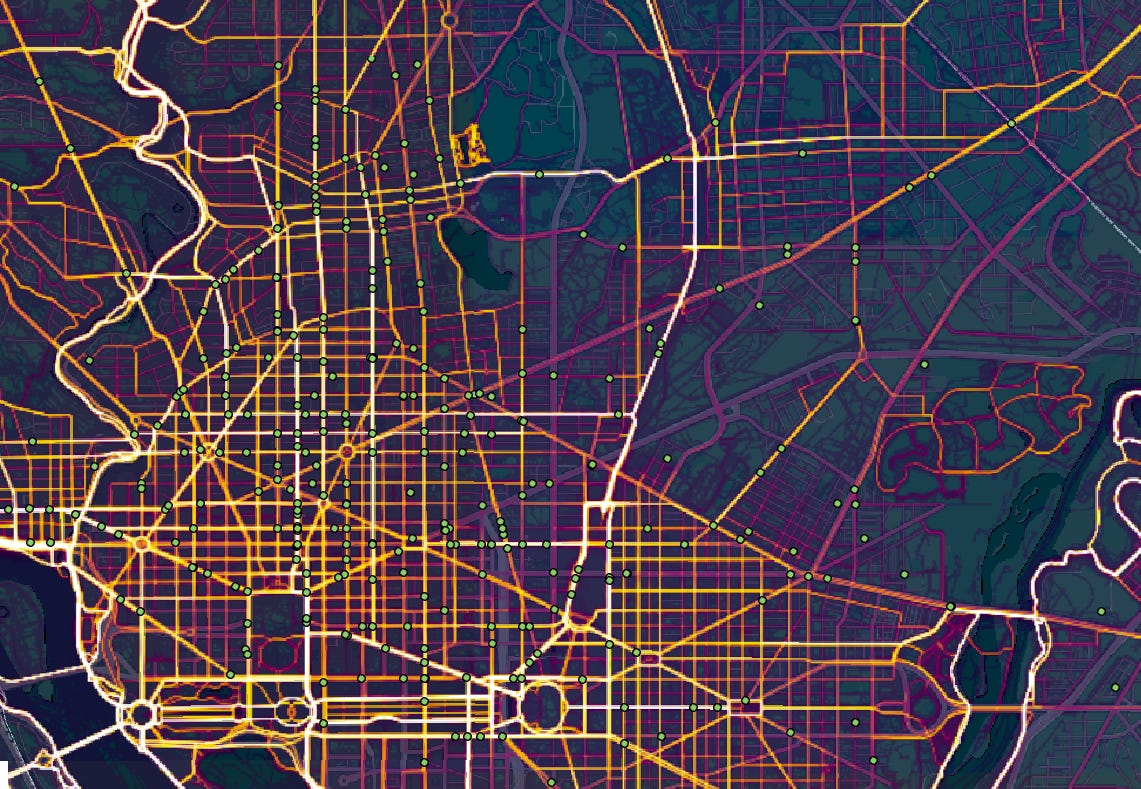Every few months, I release a newsletter post made up of small things that I want to write about but are not long enough to be individual posts. This installment of my Potpourri series, I have vignettes following up on my cycling post from last week and exploring the deletion of the Wikipedia article on Bruce Faulconer. Enjoy!

Cycling density
Last week’s post on cycling in Washington, DC was my most read post ever. Thank you to all who read, shared, critiqued, or subscribed because of it. The response from yinz was humbling. One of the common criticisms of my analysis on Twitter and Reddit was that all I was doing was showing where people bike and not where the highest risk is, à la XKCD 1137. At first blush, that is a reasonable thing to say. However, I do not think the data agrees.
Strava is an excellent resource for cyclists to connect and share rides. Their data science folks are extremely permissive as to how they share the data they collect. One of the products they release is a heatmap where people bike, run, ski, and swim. The map is great because it allows cyclists to choose routes more effectively, but it also has privacy risks.
It is the best product I can think of to gauge where people bike in DC the most. I plotted the locations of crashes that resulted in death or serious injury over Strava’s heat map. The resulting map can be seen below.

Many people cycle through the high-risk areas I identified last week. However, they are not the areas brightest on Strava’s map. Michigan Ave NE and NW is a high cycling traffic street but only has a single serious crash. Similarly, The National Mall and surrounding streets have many recorded rides but a low proportion of crashes that result in death or serious injury. There is something different about the area between G St NW and Columbia Rd NW. Those roads have many crashes, yet they are not overwhelmingly busy with cyclists.
Bruce Faulconer
Ted Gioia dropped a substack piece last week that put Wikipedia’s deletions into the conversation. In it, Gioia repeats several common misconceptions about deletion on Wikipedia that I addressed back in May, including: “you earn an article” and “Wikipedia should make up for the media not covering a topic.” Even more problematic, Gioia’s article skips over a crucial part of why the deletion discussion started.
The article on Bruce Falconer was started on 17 January 2006 by Marekso. Even back in 2006, there were worries that Falconer may not meet the inclusion requirements for Wikipedia. Over the past 16 years, the article grew and would have sat undisturbed like many long-standing articles that might be deleted if created today.
However, on 8 July, an account claiming to be Falconer edited his biography. That account was blocked, and a new account claiming to be Falconer went back to editing the article in a promotional manner. This conflict of interest editing caught the eye of Wikipedians, and the article was nominated for deletion a few days later. From 8 July to 16 July, Falconer recruited or used nine accounts to edit his biography or sway the outcome of the deletion discussion. On 19 July, the deletion discussion was closed as a redirect. If Falconer had never edited his biography, none of this would have happened.
A few days later, Dr. Blofeld rewrote the article on Falconer. I think the sourcing is a bit thin and that Dr. Blofeld used a bunch of passing mentions of Falconer to write it. Like most people on the cusp of notability, Falconer will not receive comprehensive media coverage until his obituary is released. This is one of the most frustrating things about writing Wikipedia articles.
In general, I find Gioia’s article to be a tad histrionic. In particular, his repeated use of the word “troll” to describe Wikipedia editors who even considered removing Falconer’s article. Wikipedia is not a venue for promoting people. Further, the subjects of articles have no control over how they are covered. If you would like either of those things, use your website.
Upcoming Wikipedia main page content
This month, I will have two of my article featured on the main page of Wikipedia
9 August — Saint Vincent Beer
19 August — mewithoutYou discography


